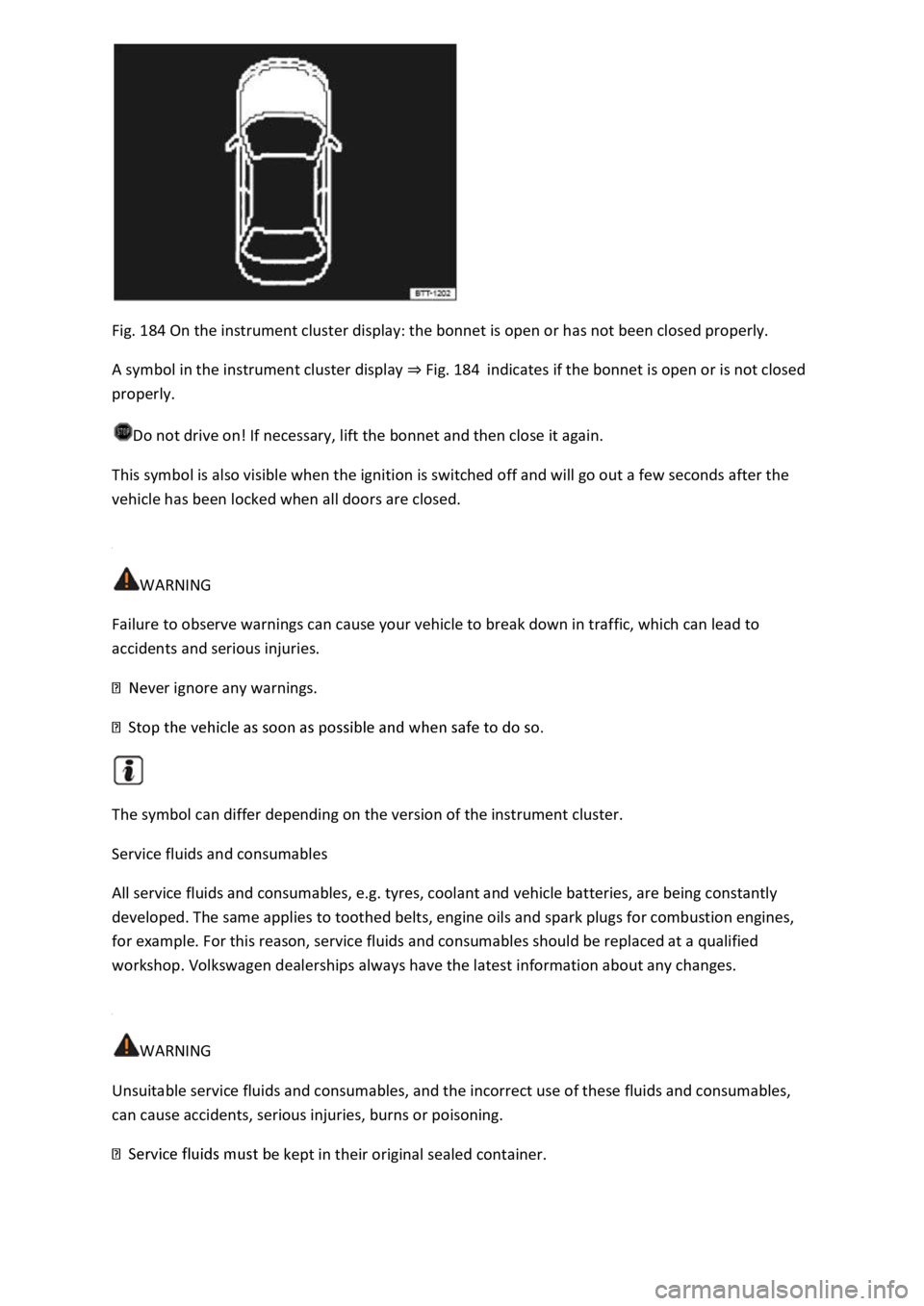Page 368 of 502

Fig. 184 On the instrument cluster display: the bonnet is open or has not been closed properly.
A symbol in the instrument cluster display Fig. 184indicates if the bonnet is open or is not closed
properly.
Do not drive on! If necessary, lift the bonnet and then close it again.
This symbol is also visible when the ignition is switched off and will go out a few seconds after the
vehicle has been locked when all doors are closed.
WARNING
Failure to observe warnings can cause your vehicle to break down in traffic, which can lead to
accidents and serious injuries.
ver ignore any warnings.
The symbol can differ depending on the version of the instrument cluster.
Service fluids and consumables
All service fluids and consumables, e.g. tyres, coolant and vehicle batteries, are being constantly
developed. The same applies to toothed belts, engine oils and spark plugs for combustion engines,
for example. For this reason, service fluids and consumables should be replaced at a qualified
workshop. Volkswagen dealerships always have the latest information about any changes.
WARNING
Unsuitable service fluids and consumables, and the incorrect use of these fluids and consumables,
can cause accidents, serious injuries, burns or poisoning.
e kept in their original sealed container.
Page 371 of 502

latest information about any changes. Volkswagen therefore recommends having engine oil changes
done by a Volkswagen dealership.
Information for warning and indicator lamps lit up can be found in the troubleshooting at the end of
the chapter Troubleshooting
WARNING
Incorrect handling of engine oil can cause serious burns and other injuries.
original container. This also applies to used oil until it is
disposed of.
may then drink the engine oil.
skin. Skin that has been in contact with engine oil
should be washed thoroughly with water and soap.
allow the engine to cool down.
Leaking or spilt engine oil can pollute the environment. Spilt service fluids must be collected and
then disposed of properly and in an environmentally responsible way.
Engine oil standards
First read and observe the introductoryinformation and safety warnings
If possible, use only Volkswagen-approved engine oil
flexible oil change service, use only approved flexible service engine oil that complies with the
corresponding VW standard.
Since the quality of fuels can vary greatly between individual markets, this must be taken into
account when selecting the correct engine oil.
The use of engine oils compliant with the VW 504 00, VW 507 00 and VW 508 00 specifications
requires a fuel quality compliant with EN 228 (petrol) and EN 590 (diesel), or fuel of an equivalent
quality. Engine oils compliant with VW 504 00, VW 507 00 and VW 508 00 are therefore unsuitable
for use in a large number of markets.
If the engine has been filled with engine oil in accordance with the standards W 502 00, VW 504 00
and VW 507 00, a sticker with the relevant information will be located on the lock carrier in the
engine compartment. Observe this information!
Page 372 of 502

You can check whether your vehicle is equipped for the Flexible Service QI6 (Longlife) or Fixed
Service QI1, QI2, QI3, QI4, QI7 (dependent on time or mileage) in the vehicle data Technical data
or on the inside cover of this owner's manual.
Permitted engine oil standards
Petrol engineswith particulate filter1)
Flexible ServiceVW 508 00 or alternatively VW 504 002)Fixed ServiceVW 502 00
Petrol engineswithout particulate filter
Flexible ServiceVW 508 00 or alternatively VW 504 00Fixed ServiceVW 502 00
Diesel engineswith particulate filter1)
Flexible ServiceVW 507 00Fixed ServiceVW 507 00
Diesel engineswithout particulate filter
Flexible ServiceVW 507 00Fixed ServiceVW 505 01
Volkswagen recommends engine oils.
NOTICE
additives is not covered by the warranty.
Using other engine oils can cause engine damage.
d engine oils are not
available. To avoid damaging the engine, a maximum quantity of 0.5 litres of the following engine oil
may be used only once until the next oil change:
SN (API SM).
ards ACEA C3 or API CJ-4.
1) Check with a qualified workshop if you are unsure whether your vehicle is equipped with a
particulate filter. Volkswagen recommends using a Volkswagen dealership for this purpose.
2) Using VW 504 00 instead of VW 508 00 may cause the vehicle's emissions values to increase
slightly.
Changing engine oil
First read and observe the introductoryinformation and safety warnings
Page 373 of 502

cable to
your vehicle Service
The engine oil and filter change should be carried out by a qualified workshop due to the special
tools and knowledge required, this also applies to the disposal of used oil. Volkswagen recommends
using a Volkswagen dealership for this purpose.
More details on the service intervals can be found in the chapter on service Service
Additives in the engine oil can cause new engine oil to discolour quickly. This is normal and does not
mean that the engine oil should be changed more frequently.
WARNING
If, in exceptional cases, you have to carry out an oil change yourself, please observe the following:
al when removing the oil drain plug with your fingers to help prevent oil
from running down your arm.
engine filling quantity.
l in empty food containers, bottles or any other non-original containers as
people finding these containers may not know that they contain engine oil.
Before changing the engine oil, first find out where old oil can be disposed of properly near you.
Used oil must be disposed of in accordance with regulations governing the protection of the
environment. Never dispose of used oil in locations such as gardens, woods, sewerage systems, on
streets and roads, or in rivers and waterways.
Engine oil consumption
First read and observe the introductoryinformation and safety warnings
Engine oil consumption can vary from engine to engine and can change during the service life of an
engine.
The vehicle may consume up to 1.0 litre of engine oil per 2,000 km, depending on your driving style
and the conditions in which the car is used. In new vehicles, consumption may be higher for the first
5,000 km. The engine oil level must therefore be checked at regular intervals, preferably each time
the vehicle is refuelled and before long journeys.
Page 433 of 502

in the display of the instrument cluster serves as a reminder for the due date of the next service
event.
Your vehicle will receive either the fixed service or flexible service for the oil change service,
depending on the vehicle equipment, the engine type and the operating conditions.
How do I know which type of service my vehicle needs?
Fig. 210(arrow) Technical data
Service eventa) PR No. Service type Service interval
Oil change service QI1 Fixed Every 5,000 km or 1 yearb).
QI2 Every 7,500 km or 1 yearb).
QI3 Every 10,000 km or 1 yearb).
QI4 Every 15,000 km or 1 yearb).
QI6 Flexible According to service interval display.
Inspection According to service interval display.
Observe the information on engine oil specifications according to VW standards Engine oil
Features of the flexible service
With the flexible service, you only need to have an oil change service carried out if your vehicle
requires one. Individual operating conditions and personal driving style are taken into account in
order to determine this point in time. An important part of the flexible service is the use of LongLife
engine oil instead of conventional oil.
Observe the information on engine oil specifications according to VW standards Engine oil
If you do not wish to have the flexible service, you can opt for the fixed service instead. However, a
fixed service can affect your service costs. Your service advisor will be pleased to help.
Service interval display
Scheduled services at Volkswagen are displayed in the service interval display in the instrument
cluster Service interval displayor in the Vehicle settings menu in the Infotainment system
Vehicle settings menues that include
an oil change or inspection. When an individual service is due, additional work that is due can also be
carried out, e.g. changing brake fluid and spark plugs.
a) Information is stated for vehicles used under normal operating conditions.
b) Whichever comes first.